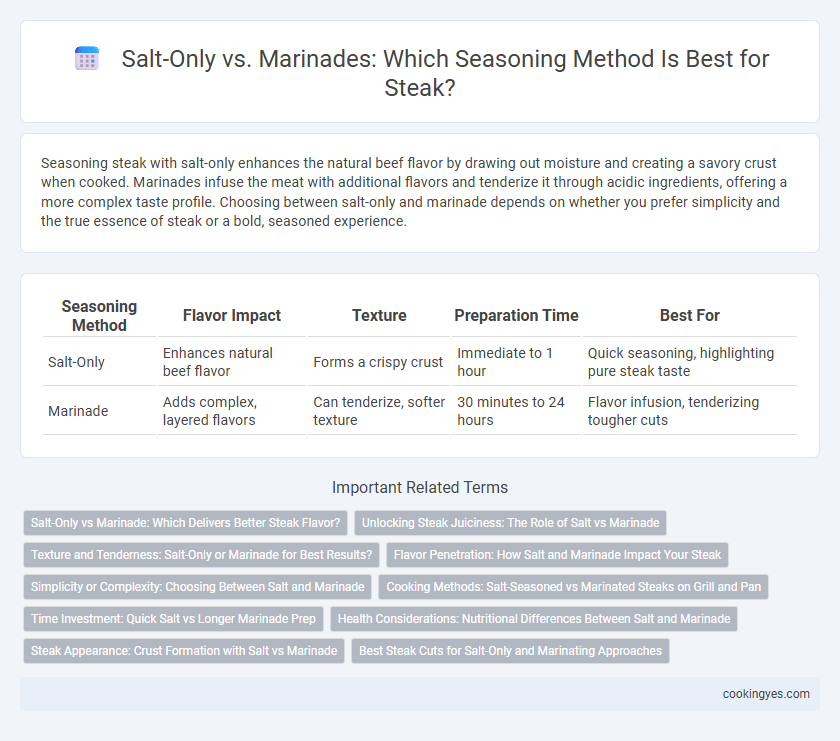Seasoning steak with salt-only enhances the natural beef flavor by drawing out moisture and creating a savory crust when cooked. Marinades infuse the meat with additional flavors and tenderize it through acidic ingredients, offering a more complex taste profile. Choosing between salt-only and marinade depends on whether you prefer simplicity and the true essence of steak or a bold, seasoned experience.
Table of Comparison
| Seasoning Method | Flavor Impact | Texture | Preparation Time | Best For |
|---|---|---|---|---|
| Salt-Only | Enhances natural beef flavor | Forms a crispy crust | Immediate to 1 hour | Quick seasoning, highlighting pure steak taste |
| Marinade | Adds complex, layered flavors | Can tenderize, softer texture | 30 minutes to 24 hours | Flavor infusion, tenderizing tougher cuts |
Salt-Only vs Marinade: Which Delivers Better Steak Flavor?
Salt-only seasoning enhances steak by drawing out natural juices and creating a savory crust through the Maillard reaction, intensifying the meat's inherent flavor. Marinades infuse additional layers of taste and tenderness by penetrating the muscle fibers with acids, herbs, and spices, but can sometimes mask the true beef profile. For purists seeking pure, robust beef flavor, salt-only is often preferred, while marinades cater to those desiring complex, varied flavor experiences.
Unlocking Steak Juiciness: The Role of Salt vs Marinade
Salt enhances steak juiciness by drawing moisture to the surface and then reabsorbing it, creating a tender, flavorful crust through protein breakdown. Marinades infuse additional flavors and can tenderize meat by incorporating acidic or enzymatic ingredients, but excessive use may alter the steak's natural texture. Understanding the balance between salt's moisture-retention properties and marinade's flavor penetration is key to unlocking optimal steak juiciness.
Texture and Tenderness: Salt-Only or Marinade for Best Results?
Salt-only seasoning enhances steak texture by drawing moisture to the surface and reabsorbing it, creating a concentrated, firm crust while maintaining internal juiciness and tenderness. Marinades, often containing acids like vinegar or citrus, break down muscle fibers, resulting in a more tender and slightly softer steak with varied flavor penetration. Choosing salt-only seasoning preserves the steak's natural texture with a crisp exterior, while marinades improve tenderness but may alter texture and moisture balance.
Flavor Penetration: How Salt and Marinade Impact Your Steak
Salt enhances flavor penetration in steak by drawing moisture to the surface, dissolving proteins, and allowing seasoning to seep deeper into the meat for a more concentrated taste. Marinades, composed of acids, oils, and spices, break down muscle fibers and infuse complex flavors throughout the steak, improving tenderness and juiciness. The choice depends on desired flavor intensity and texture, with salt providing a straightforward seasoning boost, while marinades offer layered flavor profiles and enhanced moisture retention.
Simplicity or Complexity: Choosing Between Salt and Marinade
Salt-only seasoning enhances steak's natural flavors through simple, precise salt application that draws out moisture and creates a flavorful crust. Marinades introduce complexity by infusing the meat with acids, herbs, and spices that tenderize and add multiple layers of taste. Opting for salt emphasizes purity and texture, while marinades offer rich, varied flavor profiles tailored to personal preference.
Cooking Methods: Salt-Seasoned vs Marinated Steaks on Grill and Pan
Salt-only seasoning enhances a steak's natural flavor and creates a caramelized crust when grilled or seared in a pan by drawing out moisture and promoting the Maillard reaction. Marinated steaks absorb additional flavors and tenderize the meat, resulting in a juicier texture but may require careful grill or pan timing to prevent burning due to sugar content in marinades. Both methods benefit from resting after cooking to redistribute juices, with salt-seasoned steaks favored for simplicity and marinade options offering diverse taste profiles.
Time Investment: Quick Salt vs Longer Marinade Prep
Salt-only seasoning requires minimal time investment, often just a few minutes before cooking, allowing the salt to penetrate the steak's surface and enhance natural flavors efficiently. Marinades demand a longer preparation period, ranging from 30 minutes to several hours, to allow acidic and aromatic ingredients to tenderize and infuse the meat with complex flavors. Choosing between quick salting or extended marinating depends on available time and desired depth of seasoning for an optimal steak experience.
Health Considerations: Nutritional Differences Between Salt and Marinade
Salt-only seasoning enhances a steak's natural flavor by promoting moisture retention without adding extra calories, sodium being the primary nutrient concern that can affect blood pressure if consumed excessively. Marinades often contain oils, sugars, and acidic components like vinegar or citrus juice, which introduce additional calories and nutrients, potentially impacting blood sugar and lipid levels. Choosing salt-only seasoning supports a lower calorie intake, while marinades may offer antioxidants and vitamins depending on their ingredients but require mindful portion control to maintain overall health balance.
Steak Appearance: Crust Formation with Salt vs Marinade
Salt-only seasoning enhances the steak's appearance by drawing out moisture to create a dry surface, resulting in a well-defined, caramelized crust through the Maillard reaction. Marinade, often liquid-based with acidic components, can inhibit crust formation by adding moisture that steams the steak instead of searing it, leading to a less pronounced crust. High salt concentration directly promotes a firmer, drier exterior that intensifies the rich, brown crust prized in steak preparation.
Best Steak Cuts for Salt-Only and Marinating Approaches
Prime cuts like ribeye, striploin, and filet mignon benefit most from salt-only seasoning, as the natural marbling enhances flavor and texture without masking the beef's rich taste. Tougher cuts such as flank, skirt, and chuck steak respond well to marinades, which tenderize the meat while infusing complementary flavors through acids, oils, and herbs. Salt-only seasoning preserves the purity of high-quality steaks, whereas marinating is essential for improving tenderness and flavor in less tender, leaner cuts.
Salt-only vs Marinade for seasoning Infographic

 cookingyes.com
cookingyes.com